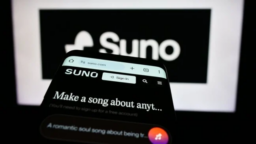There’s a serious new player in the global AI music tech space.
Chinese technology giant Kunlun Tech, which has a market cap value of 34.49 billion Chinese Yuan ($4.8 billion), has launched what it claims to be “the world’s first AI-powered music streaming platform”.
The company says that its new Melodio service features “personalized, AI-generated music streams tailored to [users’] moods and scenarios”.
Kunlun is the parent company of web browser Opera and the former owner of Grindr. It claims to have an average monthly active user base of nearly 400 million across the “AGI, AIGC, content distribution, metaverse, social entertainment, and gaming sectors”.
Kunlun is also a former investor in TikTok’s predecessor, Musical.ly. The company invested $20 million in Musical.ly before the app was acquired by ByteDance in 2017 for more than $800 million. Musical.ly merged with TikTok the following year.
Last summer, Kunlun’s Star Group Interactive division acquired a stake in AI company Singularity AI in a $160 million deal. Following the deal, Kunlun pumped $400 million into its Star Group division.
According to Kunlun, its new Melodio service lets users input prompts like “energetic music for a long drive” or “mellow tunes for morning coffee.” It will then “instantly craft a customized music stream that fits the occasion”.
Added Kunlun in its announcement: “With endless streams of real-time, personalized music, Melodio caters to users’ every mood and scenario, enabling them to modify their prompts on the fly, switch between generated lyrics, and save or share their favorite moments for a truly transformative listening experience.”
In addition to the AI streaming service, Kunlun has also launched an AI music creation platform called Mureka, which the company claims “empowers music enthusiasts and professional artists to create and monetize their AI-generated music”.
Users can even sell their AI music via the Mureka Store, which Kunlun claims will allow artists to “explore new business models for AIGC”.
According to Kunlun, on Mureka’s ‘Create’ page, users “can input lyrics, reference tracks, and control music styles using the Style function”.
The company claims that Mureka’s AI music “boasts unparalleled stability and controllability, allowing users to fine-tune sections like intros, verses, choruses, bridges, and outros with ease”.
Added Kunlun in its announcement: “Completed songs can be extended or re-generated as needed, ensuring a seamless creative process. Users can also display, listen to, collect, share, and download AI-generated music, while also obtaining a certificate of AI music generation.”
“These platforms represent the future of music, where AI and human creativity intertwine to unleash boundless possibilities.”
Kunlun tech
Kunlun also said that “with Melodio and Mureka, Kunlun Tech is pushing the boundaries of what’s possible in music consumption and creation”.
It added: “These platforms represent the future of music, where AI and human creativity intertwine to unleash boundless possibilities.”
Both products launched by Kunlun this week, the Melodio streaming service and Mureka AI music generator, are powered by Kunlun’s AI Music Generation Large Language Model (LLM), called SkyMusic 2.0.
Kunlun claims that its SkyMusic 2.0 LLM stands as “the industry’s first AI music model capable of consistently and stably generating endless music feed in specific styles”.
The company claims further that the LLM is able to process lyrics exceeding 500 words and produce 6-minute, 4400Hz dual-channel stereo AI songs.
According to Kunlun, SkyMusic was the first “commercial-grade composing AI model in China”.
It supports 31 languages, including Chinese, English, Japanese, Korean and French, and supports lyric generation from melodies and text material.
Kunlun has not disclosed the data that its SkyMusic 2.0 LLM has been trained on.
Kunlun Tech and SINGULARITY AI jointly developed an LLM called SkyWork, which Kunlun claimed last year “is benchmarked against ChatGPT” and “interacts with users through natural language”.
The company added that SkyWork’s AI generation capabilities “can meet the needs of copywriting, knowledge questions, and answers, code programming, logical deduction, mathematical calculations, etc.”
In this research paper detailing Kunlun’s Skywork-13B family of large language models, the research team cites “publicly accessible webpages” as their “primary source for training data”.
The research paper claims that “this bilingual foundation model is the most extensively trained and openly published LLMs of comparable size to date”.
Music rightsholders will likely be following the launch of these two new AI platforms very closely.
Just two months ago, controversial AI music startups Suno and Udio were sued by the major record companies for allegedly training their systems using the labels’ recordings without permission.
In responses filed in US federal courts earlier this month, the two AI companies pretty much admitted that they used copyrighted recordings from the recording companies that sued them.
Suno, for example, explained that its “training data includes essentially all music files of reasonable quality that are accessible on the open Internet, abiding by paywalls, password protections, and the like, combined with similarly available text descriptions.”
Both Suno and Udio argued that their use of copyrighted materials – owned by Sony Music Group, Universal Music Group and Warner Music Group – falls under the “fair use” exemption to US copyright law.
Seperately, in October last year, UMG sued AI company Anthropic for the alleged “systematic and widespread infringement of their copyrighted song lyrics” via its chatbot Claude.Music Business Worldwide





